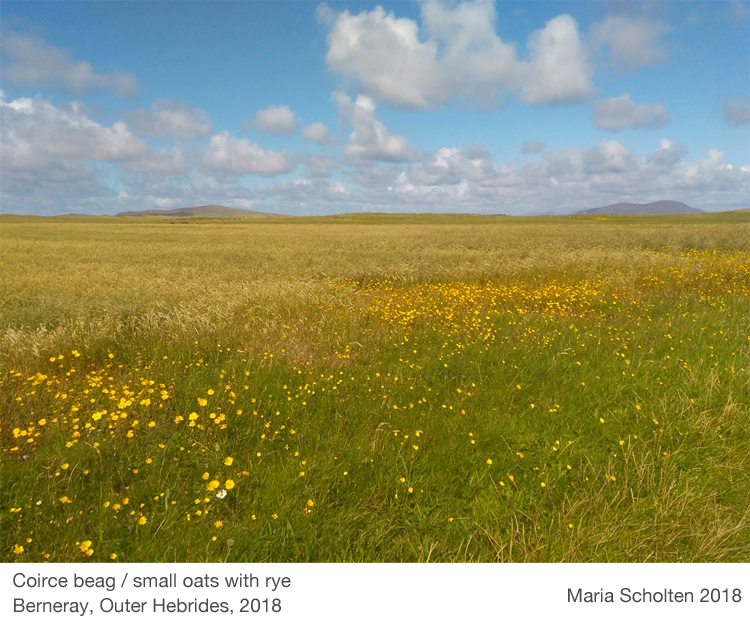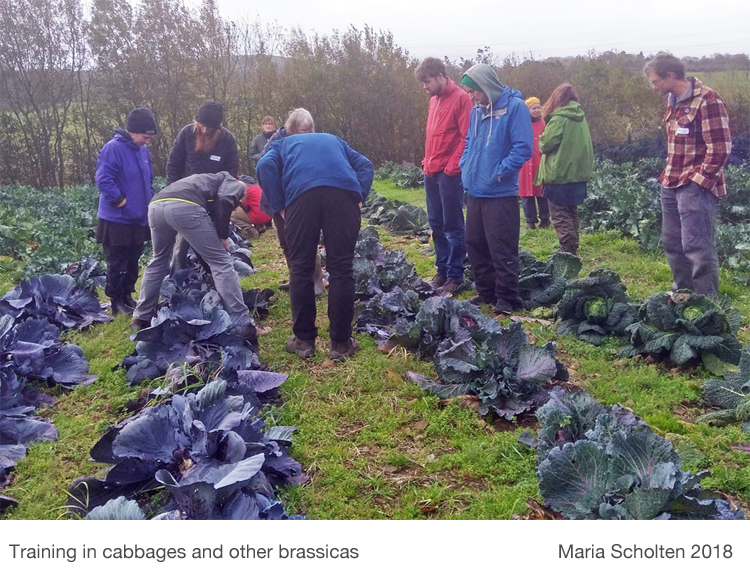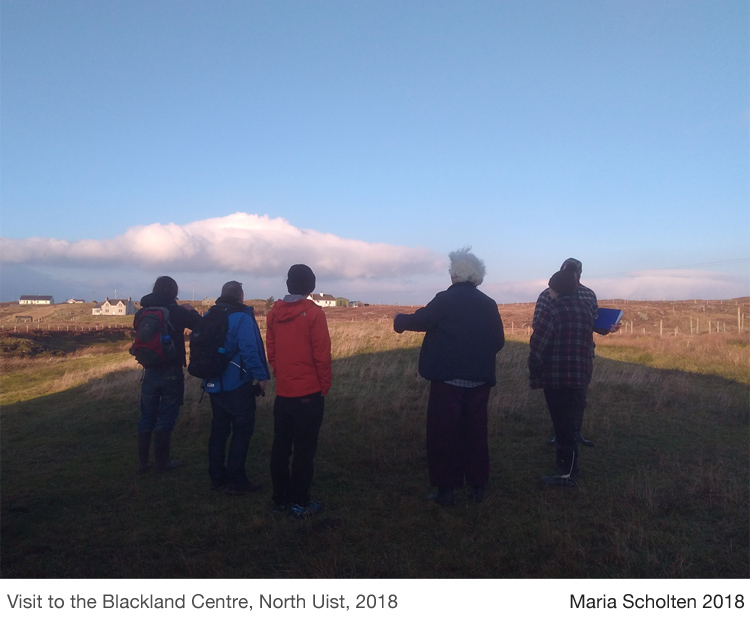Maria Scholten introduces the Seed Sovereignty Programme, managed at the Gaia Foundation and aiming to boost local and organic small-scale seed production.
The majority of the ‘organic’ products we purchase and consume are grown by organic methods, but not necessarily from organic seed, as demand for organic seeds is bigger than supply. The UK and Ireland Seed Sovereignty Programme seeks to address this by supporting small-scale growers in steps towards a more resilient agroecological [1] seed system with regional diversity at its heart.

The UK and Ireland Seed Sovereignty programme
Small-scale seed producers are often maintaining varieties that are too ‘niche’ for larger seed companies. The focus on hybrid seeds has led to dramatic reductions of open pollinated varieties – for example, see the Open Pollinated Seeds web pages [2]. Countering this trend, small-scale seed producers have an important role in the conservation of horticultural biodiversity!
The Seed Sovereignty Programme aims to boost seed-saving skills and offer models of diversifying vegetable growing with seed production for agro-ecological growing. Our objectives are:
- support and cultivate regional and national connections and collaboration to provide coherence across the food and seed sector,
- support farmers and growers with further skills, resources and information,
- foster a more supportive environment for a biodiverse and ecologically sustainable seed systems to thrive.
Small scale seed producers
There are few small scale seed producers in Scotland. One of them is the herb nursery & herb seed producer Duncan Ross at Poyntzfield Herb Nursery on the Black Isle [3]. Duncan has collected widely and during his 40 year work built up an impressive collection of herbs and salads adapted to Scottish growing conditions.
The only remaining seed producers association in Scotland is the Scots Timothy Seed Growers Association who maintain a landrace of Timothy grass Phleum pratense [4]. They were formed in 1962 to conserve and promote this last remain grass landrace.
Scotia Seeds is a small-scale seed company, based at Mavisbank Angus, and specialising in wild native plant seeds & mixtures [5]. Many species of known provenance are bulked annually and offered for sale.
There are still a few landraces around with seed produced and distributed locally. A good source of information can be found at www.scottishlandraces.org maintained by SASA [6].

The seed programme in 2018
In Scotland in the first year of the programme in 2018 we delivered basic vegetable seed saving trainings in Aberdeenshire, Lothian and on the Black Isle. Over fifty persons, commercial growers, community growers as well as allotment growers attended these well-received events.
The seed trainings covered seed plant reproduction biology; inbreeding/outbreeding crops and implications for number of seed plants required to avoid inbreeding depression and to maintain genetic diversity; different types of pollination and implications for seed crop isolation and spacing; seed crop husbandry and seed borne diseases; seed harvesting, processing, drying and storage.
2019 events [7]: a series of four seed saving workshops in Glasgow in collaboration with Glasgow Local Food Network is starting 30 March; selection workshop at the Cyrenian Farm near Edinburgh on 31 August, and events around traditional grain growing in Lochaber.
Heritage grain growing
Interest in heritage grain growing among crofters in the Highlands led to a visit to Uist in November 2018 for a crofter-to-crofter technical meeting on traditional grain growing. The trip included a visit to the Blackland Centre to study redeveloping neglected croft land [8]. This was not a one-off touristic trip but will actually lead to reintroducing traditional grain growing in Lochaber in 2019 – the first time in decades. The grain experiment is planned to link in with the Plant Teams project at James Hutton Institute and facilitated by the Soil Association Scotland.
For the traditional crofters’ mixtures of rye, small oats, and bere – the interest is widespread and more crofters and smallholders have come forward with an interest in growing. The interest is shared by a Welsh growers group keen on starting to grow traditional oats. This has raised issues such as where the seeds can be sourced and also what is a traditional Welsh oats?
In Scotland this seems to be less of an issue as oat landraces are still grown – more widely on the Uist than on Orkney and Shetland, in the form of coirce beag, Orkney Traditional Black oats or Shetland Aets respectively – different names for the same species, Avena strigosa [9].
However, for those crofters with an interest in common oats or porridge oats, Avena sativa, the questions arise: which varieties are traditional Scottish oats and where are the seeds? To start with the latter: the seeds are in genebanks and will years of multiplying before they can be reintroduced to field scale grain growing.
It can be done. Andrew Whitley did a sterling job with Scotland the Bread [10] and set a good example with his Scottish heritage wheats multiplied by community groups and individual growers throughout Scotland.
Organisation, funding, contact
The programme is led by The Gaia Foundation, implemented by five regional or national coordinators in Ireland, England, Wales and Scotland. It works in partnership with the Irish Seed Savers, The Land Workers’ Alliance, the Soil Association and seed companies Real Seeds, The Seed Cooperative and Beyond GM. The project has received funding from the A Team Foundation, Esmée Fairbairne Foundation and the Evan Cornish Foundation.
Contact: Maria Scholten, Coordinator in Scotland for The UK and Ireland Seed Sovereignty Programme. email: maria@gaianet.org. Web site: www.seedsovereignty.info. Twitter: @Scotseedsov

Sources, references, links
[1] Author’s note: Agroecology applies ecological concepts and principles to food and farming systems, focusing on the interactions between microorganisms, plants, animals, humans and the environment.
[2] Open Pollinated Seeds www.open-pollinated-seeds.org.uk provides explanation, educational material and many useful links on the value of maintaining open pollinated seed production as a means of promoting biodiversity and making seed accessible to all.
[3] Poyntzsfield Herb Nursery www.poyntzfieldherbs.co.uk been ‘growing herbal plants and seeds including native species since 1976’. They grow a global collection of plants for seed mostly on site, including Scottish native plants with herbal properties. A short video about their work can be seen on vimeo.com/video/303756632
[4] The Scot’s Timothy web site www.scotstimothy.co.uk (Ed: website unavailable 2019/04/18, will check and update) describes work on maintaining the Timothy landrace – ‘the only landrace grass seed variety still grown for commercial production in the UK’. Their web site has useful information and links on ‘Biodiversity and conservation’ and ‘Landrace Farmers’. Seed is available via the web site from their farm at Menstrie, Clacks.
[5] Scotia Seeds www.scotiaseeds.co.uk based in Angus, is one of the largest wild plant seed providers in the UK. Along with the James Hutton Institute, Kew and a range of wildflower seed producers they were partners in the EU NASSTEC project Native Seed Science, Technology and Conservation Initial Training Network www.nasstec.eu/home.
[6] Science and Advice for Scottish Agriculture or SASA is a government funded body that (among many other duties) maintains several plant landraces, details at www.sasa.gov.uk/variety-testing/scottish-landraces.
[7] Project events in 2019: contact Maria Scholten for details. Further information on some of the organisations/venues: Glasgow Local Food Network glasgowlocalfood.blogspot.com and the Cyrenian’s Farm near Edinburgh cyrenians.scot/community-and-food/good-food/farm.
[8] The Blackland Centre in Grimsay, North Uist supports research and practice on the regeneration of production on blackland, typical crofting areas on acidic, organic soils. See www.blacklandcentre.org/contact/the-blackland-centre/.
[9] More on bristle oat or black oat Avena strigosa is given on the Living Field page on Cereals.
[10] Scotland the Bread scotlandthebread.org is ‘an innovative social business, owned by its members’ aiming ‘to establish a Scottish flour and bread supply that is healthy, equitable, locally controlled and sustainable’. The page on ‘Heritage four and grain’ describes their work on regenerating wheat varieties from the 1800s.
